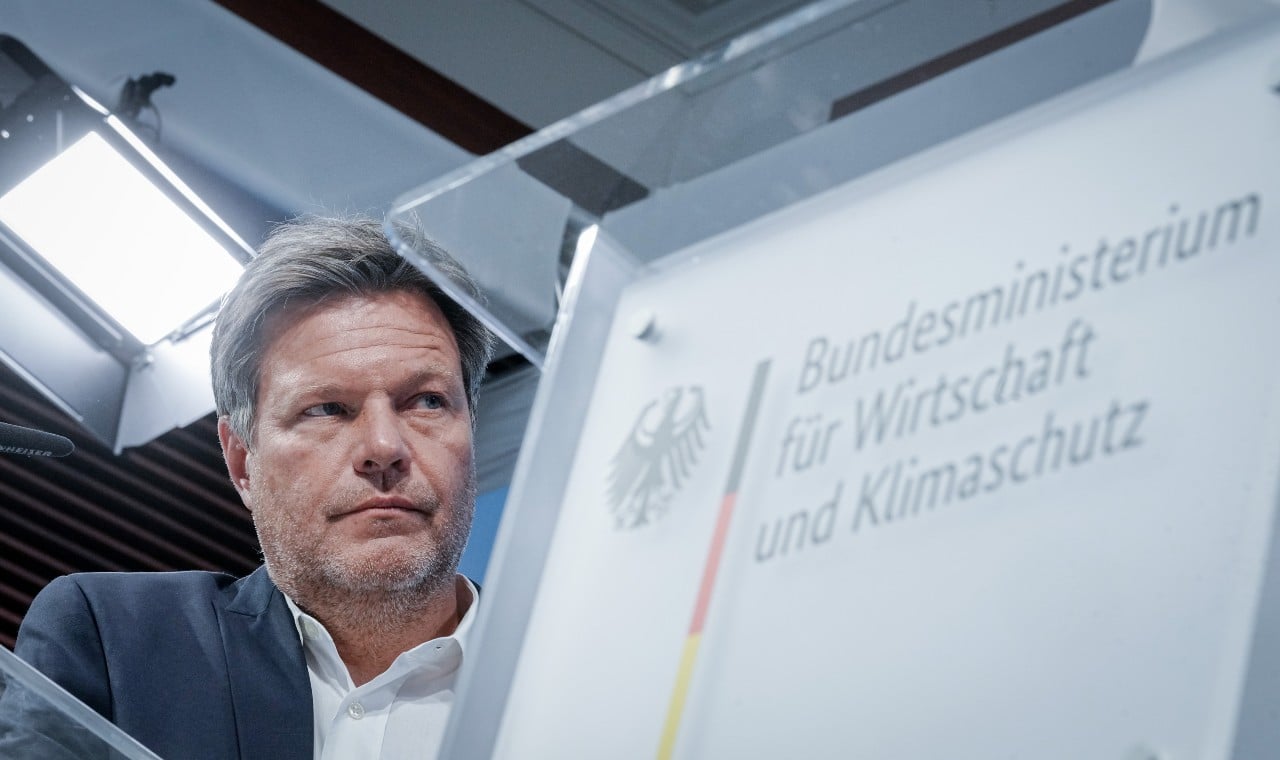Today in Germany: A round-up of the latest news on Tuesday

From a lower number of illegal border crossings to a far-right teen taken into custody, here's some of the biggest news from around Germany on Tuesday.
German defence chief vows support in Ukraine visit
German Defence Minister Boris Pistorius arrived in Kyiv on Tuesday for an unannounced visit to reaffirm Berlin's backing for Ukraine in its fight against Russia's troops.
Berlin, the second-biggest supplier of military assistance to Kyiv after the United States, is seeking to offer the reassurances after the shift in focus to the Middle East war prompted concerns about waning support for Ukraine.
It was Pistorius's second visit to Kyiv since he became defence minister at the start of this year.
"I am here again, firstly to pledge further support, but also to express our solidarity and deep bond and also our admiration for the courageous, brave and costly fight that is being waged here," Pistorius said laying flowers at Maidan square in central Kyiv.
The visit comes after an increase in Russian air attacks on Ukraine and as Kyiv braces for an expected rise in strikes on the country's energy facilities over the coming winter months.
Fewer illegal border crossings reported in October
New figures released on the number of migrants crossing Germany's borders without permission suggest that new checks are having an effect. In October, the number of illegal crossings went down for the first time in several months.
According to the Federal Police, the past month saw just over 20,000 people apprehended after crossing the borders without the correct papers. That represents a decline of 1,300 compared to September.
However, the number of irregular crossings will still be higher this year than in 2022, when around 92,000 illegal crossings were recorded. In the first ten months of 2023 alone, this figure had risen to around 112,000.
In light of increasing migration figures, Interior Minister Nancy Faeser (SPD) put stationary border controls in place at Germany's Swiss, Polish and Czech borders on October 16th this year. These were initially meant to last for ten days but have been repeated extended since then. Checks at the Austrian border have been in place for years.
READ ALSO: Why are German police carrying out checks on hikers at the borders?
According to police reports, the checks at the four borders between mid-October and mid-November resulted in around 11,000 unauthorised entries and 266 arrests of people smugglers.
German police arrest teen for planning far-right attack
An 18-year-old man steeped in extreme right and anti-Semitic ideology was arrested on Monday over suspicions of planning an attack, police have confirmed.
He had "repeatedly threatened to kill people in the pursuit of his political goals on specialised forums" and was marked by "right-wing extremism and anti-Semitic convictions with a disposition to commit violent acts", said judicial police in the Hesse region, where the arrest took place.
The teen was remanded in custody following an investigation that lasted several months.
During a search of his home, police found arms, munitions and seized several computers and cell phones, a statement said.
German authorities have repeatedly warned of the risk of right-wing extremist attacks targeting people of foreign origin, Jews and left-wing figures in particular.
An attack on a synagogue in Halle, in the east of the country, had taken place in October 2019 .
A racially-motivated attack occurred in Hanau, near Frankfurt, in February the following year that saw nine people killed.
Energy price cap 'under threat' after landmark court ruling
A bombshell ruling that left Germany struggling to find €60 billion in government funding could potentially spell the end of the price caps on gas and electricity, Economics Minister Robert Habeck has warned.
Speaking on Deutschlandfunk on Monday, Habeck said that the decision from the Constitutional Court to invalidate €60 billion of borrowing to fight climate change could also impact the so-called Economic Stabilisation Fund (WSF), which was set up after Russia's invasion of Ukraine and includes financing for the price breaks.
READ ALSO: Why a German court struck down a €60 billion fund for climate change

Economics Minister Robert Habeck (Greens) in Berlin. Photo: picture alliance/dpa | Kay Nietfeld
"Because the judgment is so fundamental, it actually refers to all funds that have been set up and that carry over from year to year,” the Greens politician said.
This would also affect funds that have already been paid out this year. By the end of October, €31.2 billion had already flowed from the WSF, including €11.1 billion for the gas price brake and €11.6 billion for the electricity price brake, plus €4.8 billion for emergency natural gas aid and €3.7 billion in subsidies for the energy network.
The WSF was financed through a special €200 billion loan that was intended to carry over until summer, but Habeck explained that after the court ruling both future spending and money that had already been spent may be called into question. That could mean that customers could have to bear the brunt of higher energy prices after all.
Calls grow to suspend debt brake
Meanwhile the Finance Ministry said Monday it is putting a spending freeze on multi-year projects due to the ruling by the Constitutional Court.
The government has been debating how to deal with the implications of the court decision. The Social Democrats have reiterated their calls for the debt brake to be suspended - at least for 2024 - to plug the €60 billion funding hole.
Germany's constitutionally enshrined debt brake limits annual new borrowing to 0.35 percent of gross domestic product.
The brake was suspended from 2020-2022 to deal with the pandemic and energy crisis due to emergencies, but came back into force this year.
READ ALSO: German government rows over how to plug €60 billion funding gap
Comments
See Also
German defence chief vows support in Ukraine visit
German Defence Minister Boris Pistorius arrived in Kyiv on Tuesday for an unannounced visit to reaffirm Berlin's backing for Ukraine in its fight against Russia's troops.
Berlin, the second-biggest supplier of military assistance to Kyiv after the United States, is seeking to offer the reassurances after the shift in focus to the Middle East war prompted concerns about waning support for Ukraine.
It was Pistorius's second visit to Kyiv since he became defence minister at the start of this year.
"I am here again, firstly to pledge further support, but also to express our solidarity and deep bond and also our admiration for the courageous, brave and costly fight that is being waged here," Pistorius said laying flowers at Maidan square in central Kyiv.
The visit comes after an increase in Russian air attacks on Ukraine and as Kyiv braces for an expected rise in strikes on the country's energy facilities over the coming winter months.
Fewer illegal border crossings reported in October
New figures released on the number of migrants crossing Germany's borders without permission suggest that new checks are having an effect. In October, the number of illegal crossings went down for the first time in several months.
According to the Federal Police, the past month saw just over 20,000 people apprehended after crossing the borders without the correct papers. That represents a decline of 1,300 compared to September.
However, the number of irregular crossings will still be higher this year than in 2022, when around 92,000 illegal crossings were recorded. In the first ten months of 2023 alone, this figure had risen to around 112,000.
In light of increasing migration figures, Interior Minister Nancy Faeser (SPD) put stationary border controls in place at Germany's Swiss, Polish and Czech borders on October 16th this year. These were initially meant to last for ten days but have been repeated extended since then. Checks at the Austrian border have been in place for years.
READ ALSO: Why are German police carrying out checks on hikers at the borders?
According to police reports, the checks at the four borders between mid-October and mid-November resulted in around 11,000 unauthorised entries and 266 arrests of people smugglers.
German police arrest teen for planning far-right attack
An 18-year-old man steeped in extreme right and anti-Semitic ideology was arrested on Monday over suspicions of planning an attack, police have confirmed.
He had "repeatedly threatened to kill people in the pursuit of his political goals on specialised forums" and was marked by "right-wing extremism and anti-Semitic convictions with a disposition to commit violent acts", said judicial police in the Hesse region, where the arrest took place.
The teen was remanded in custody following an investigation that lasted several months.
During a search of his home, police found arms, munitions and seized several computers and cell phones, a statement said.
German authorities have repeatedly warned of the risk of right-wing extremist attacks targeting people of foreign origin, Jews and left-wing figures in particular.
An attack on a synagogue in Halle, in the east of the country, had taken place in October 2019 .
A racially-motivated attack occurred in Hanau, near Frankfurt, in February the following year that saw nine people killed.
Energy price cap 'under threat' after landmark court ruling
A bombshell ruling that left Germany struggling to find €60 billion in government funding could potentially spell the end of the price caps on gas and electricity, Economics Minister Robert Habeck has warned.
Speaking on Deutschlandfunk on Monday, Habeck said that the decision from the Constitutional Court to invalidate €60 billion of borrowing to fight climate change could also impact the so-called Economic Stabilisation Fund (WSF), which was set up after Russia's invasion of Ukraine and includes financing for the price breaks.
READ ALSO: Why a German court struck down a €60 billion fund for climate change

"Because the judgment is so fundamental, it actually refers to all funds that have been set up and that carry over from year to year,” the Greens politician said.
This would also affect funds that have already been paid out this year. By the end of October, €31.2 billion had already flowed from the WSF, including €11.1 billion for the gas price brake and €11.6 billion for the electricity price brake, plus €4.8 billion for emergency natural gas aid and €3.7 billion in subsidies for the energy network.
The WSF was financed through a special €200 billion loan that was intended to carry over until summer, but Habeck explained that after the court ruling both future spending and money that had already been spent may be called into question. That could mean that customers could have to bear the brunt of higher energy prices after all.
Calls grow to suspend debt brake
Meanwhile the Finance Ministry said Monday it is putting a spending freeze on multi-year projects due to the ruling by the Constitutional Court.
The government has been debating how to deal with the implications of the court decision. The Social Democrats have reiterated their calls for the debt brake to be suspended - at least for 2024 - to plug the €60 billion funding hole.
Germany's constitutionally enshrined debt brake limits annual new borrowing to 0.35 percent of gross domestic product.
The brake was suspended from 2020-2022 to deal with the pandemic and energy crisis due to emergencies, but came back into force this year.
READ ALSO: German government rows over how to plug €60 billion funding gap
Join the conversation in our comments section below. Share your own views and experience and if you have a question or suggestion for our journalists then email us at [email protected].
Please keep comments civil, constructive and on topic – and make sure to read our terms of use before getting involved.
Please log in here to leave a comment.